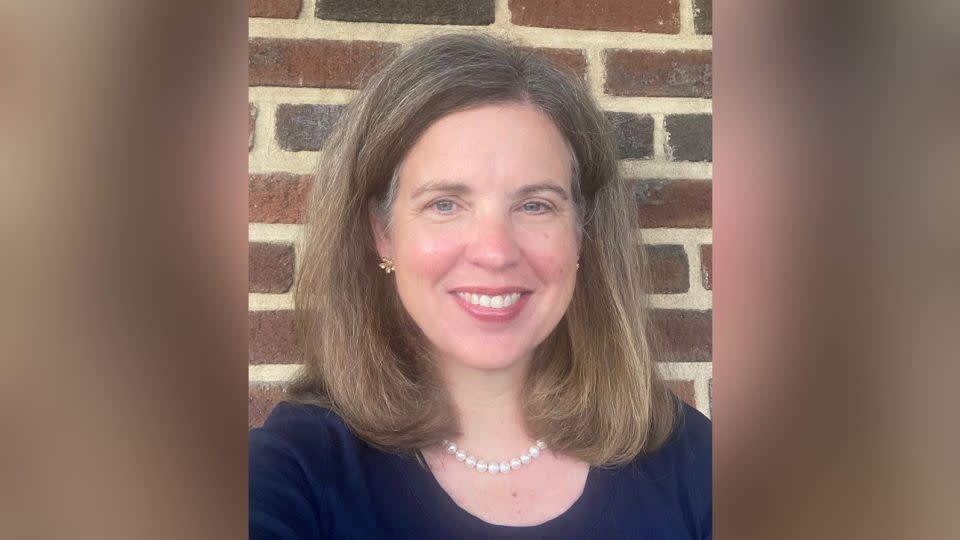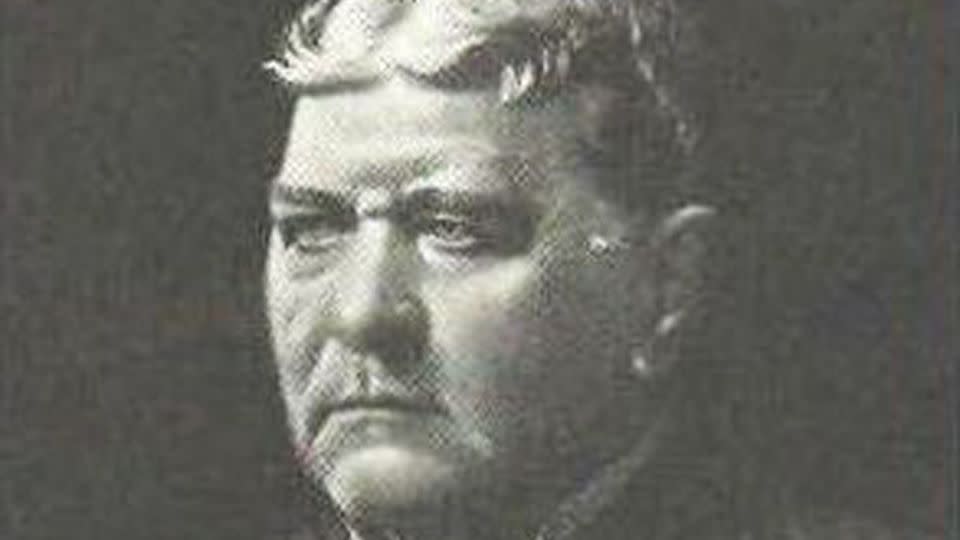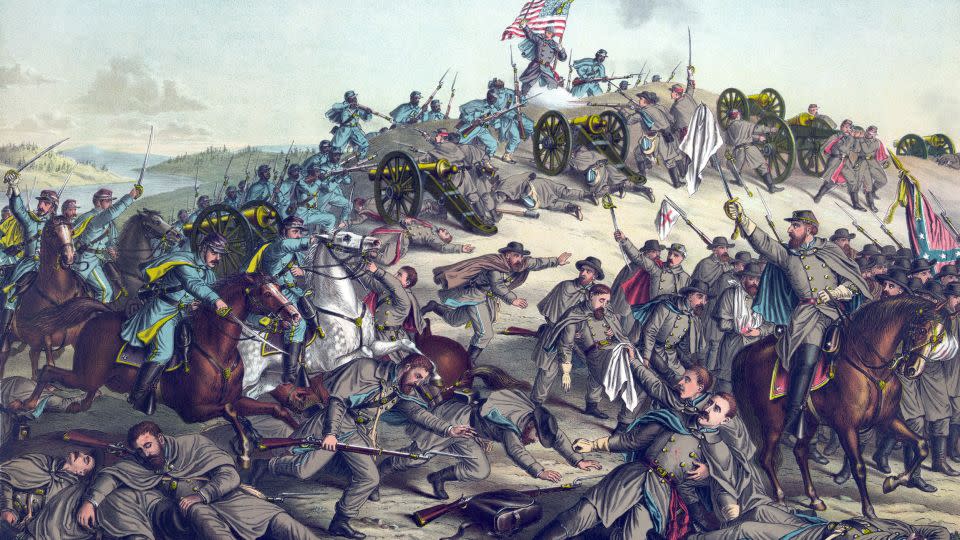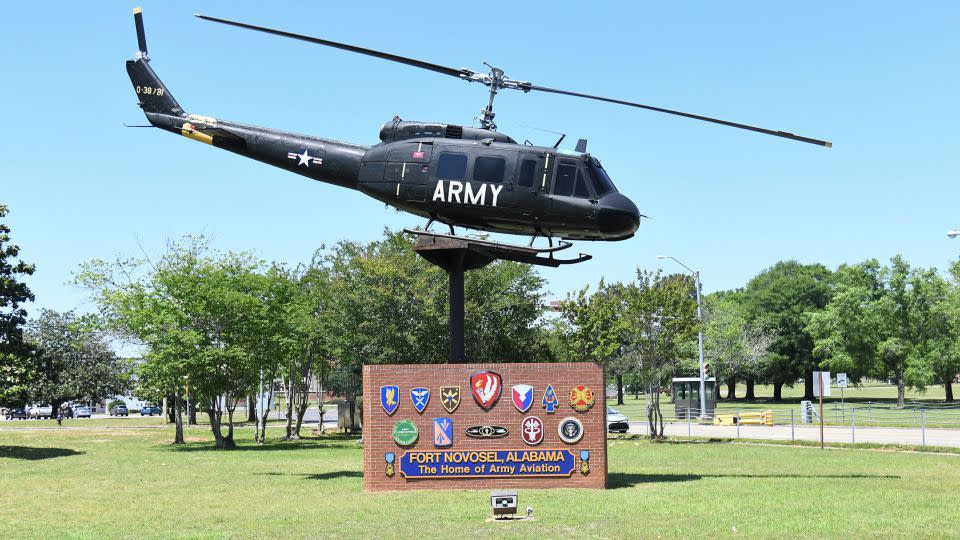Opinion: My family lost the Civil War. Last year they finally gave up this symbol of power
Editor’s Note: K. Denise Rucker Krepp, a career Navy civilian employee, is a former Maritime Administration chief counsel who started her federal career as a Coast Guard officer. She subsequently served as a Transportation Security Administration lawyer and House of Representatives Homeland Security Committee senior counsel. The views expressed in this commentary are her own. Read more opinion at CNN.

My family’s Rucker surname is familiar in some military circles and among many who consider themselves aficionados of Confederate history. The Ruckers have a history of military service going back generations. They’ve also had deep roots in America’s shameful Confederate past. That includes my distant cousin, Col. Edmund Rucker.
The United Daughters of the Confederacy named a chapter in Alabama after Col. Rucker about 37 years ago. But an even bigger honor came back in 1942, when the US military named an Army base in Alabama after him. The base bore the name Fort Rucker until one year ago this month, when the military stripped it away.
To be clear, I’m not proud of my family’s legacy or its history in one of the darkest chapters of America’s past. I’m also not blind to the fact that I share the Rucker name with many Black Americans. Ruckers and their relatives owned plantations throughout the South, including in Virginia, Georgia, Mississippi and Alabama.
There are even communities bearing the family name — “Ruckersville” — in Virginia and Georgia. It’s never far from my mind, when I meet a Black American bearing the Rucker name, that there’s a good chance we are connected, although not by marriage. We are, quite possibly, related by slavery.
A step toward justice and healing
Having a military base or other military asset named after an ancestor is a big deal. It turns out that getting that name removed is no small thing. But in the case of Confederates like Edmund Rucker having their names removed from bases it was a necessary step toward justice and healing.
The process of changing the name of Fort Rucker began in 2020 amid the protests that erupted as a result of the killing of George Floyd and the subsequent discussions about racism. Congress included a provision in the National Defense Authorization Act for Fiscal Year 2021 creating a commission tasked with recommending new names for, or removal of, military assets named after Confederates. Former President Donald Trump vetoed the legislation, but there was overwhelming bipartisan and bicameral support for the change, and Congress voted to override him.

The military services assigned liaisons to help the commission identify assets named for Confederates and I was asked to be the Navy liaison. I was thrilled to be able to take part in the process of removing my family’s name from the Army base in Alabama. And there are other Confederate descendants who supported renaming federal assets bearing the names of relatives who, instead of fighting to preserve the United States, fought to dissolve it.
Until then, I hadn’t spoken about my family lineage to my bosses at the US Navy. I hadn’t shared that I’m part of the same family for whom Fort Rucker was named. I hadn’t shared that my great, great, great grandfather Howell Cobb was president of the Provisional Confederate Congress and had sworn in Jefferson Davis as president of the Confederate States of America. Nor had I shared that Cobb had authorized construction of the ship that fired the first naval shot in the Civil War. I quickly told Navy leaders who I was, and they told me that I had a job to do. My next phone call was to the Army. They were providing administrative support to the Naming Commission. A Rucker was going to help them.
Prior to joining the Navy as a civilian, I’d served on active duty in the Coast Guard. My parents were both Army officers so my military service wasn’t unexpected, but the choice of service was. From time to time, my parents asked me why I hadn’t joined the Army, as they had. My answer was always the same — because I didn’t want to have to answer questions about my last name. Growing up as an Army brat, I was repeatedly asked if I had any connection to Fort Rucker. I didn’t want to have to answer the same questions as a military officer.
Once the renaming process was underway, however, that anonymity was over. The creation of the Naming Commission led me to examine anew how my family’s history, including the very Rucker name, had hurt others over centuries. I was especially mindful about the experience of Black American military personnel.
How, I wondered, did Black Army personnel feel about serving on a base named for a Confederate? How did it feel to be required to wear shirts emblazoned with the name of a man who supported slavery? And I’ve often asked myself how Black Americans felt about reciting the Pledge of Allegiance at a military base named for someone who fought against the Union and who was committed to their subjugation and enslavement.
Shortly before the fort’s name was changed, I published an essay expressing support for the change. I received a barrage of negative responses on social media accusing me of being “woke” — of turning my back, in their view, on my family. Turning my back on my family? The family that owned hundreds of slaves and committed treason? Others have said they were baffled by my failure to recognize the rare honor bestowed on my family in having a military base named after a relative. Not many families have federal installations named after them so, surely, I must be proud of the designation. Honor is more than a word, however. There was nothing honorable about taking up arms against this country.
Honor is more than a word
The renaming process went on for months. Every now and again during the commission’s tenure, my father Army Col. T.W. Rucker would ask about how things were going with the renaming. We talked about Col. Edmund Rucker and about General Henry Lewis Benning, another relation for whom an Army base, Fort Benning, was named in Georgia. Dad expressed pride and support for my participation in the process. My cousins and sisters shared the same message — keep going, Denise.
More than once, my father shared that in other countries men who commit treason were shot. That didn’t happen to my family members, however. Grandpa Cobb’s portrait was hung in the US Capitol until 2020, when it was taken down. My great, great grandfather Tinsley White Rucker served as a Confederate soldier and then later in life served as a member of the US Congress. Another relative, Lucius Q.C. Lamar, became the first former Confederate to join the US Senate in 1877. Then-President Grover Cleveland named Lamar to be Secretary of the Interior in 1885 and then Lamar became a justice on the Supreme Court in 1888. My family lost the war, but they never lost power.

Of course, in my family’s many generations of military service, there were some who served honorably. My father and his brother served in Vietnam. My uncle was badly shot up, but came home alive. Over 58,200 Americans reportedly did not, and their names are forever etched on the Vietnam Veterans Memorial. I associate the memorial with my dad’s West Point reunions.
Each Washington, DC gathering included a wreath-laying ceremony honoring the classmates who were killed. Some of the family and loved ones of those who did not come home also attended the reunions. Each time was a poignant reminder to me how lucky I was to have my dad in my life — he was there for my college graduation and for my wedding.
Fort Novosel
I thought of those reunions when I learned about the selection of Army Chief Warrant Officer 4 Michael Joseph Novosel Sr., whose name came to replace that of my forebear at Fort Rucker. Novosel served in three wars — World War II, Korea and Vietnam. He was awarded the Medal of Honor for actions taken in Vietnam. He risked his life to save others.
Novosel flew 2,543 missions in Vietnam and helped evacuate more than 5,500 wounded personnel. Because of him, fathers, brothers, uncles, and sons came home. They lived to see major milestones in the lives of their family members. I can’t think of a better hero to replace the name of my cousin who betrayed this country.

Millions of American men and women are serving in our military or have already served. Many more will serve in the future. Each service member raises their hand to pledge allegiance to the United States. It is right and just that the federal bases and ships on which they serve are named not for traitors to our country, but instead honor American heroes like Novosel.
I still get pushback sometimes over my decision to take part in the process to correct a historic wrong that honored the military service of a man who deserved to be reviled. I recently attended a history conference where I was chastised for supporting the Naming Commission. One attendee criticized the decision to remove honorable, historic Southern names from our monuments. I countered that the names weren’t honorable, and he disagreed. I then volunteered that I’m a Rucker and that I supported the change. That’s when he stopped talking.
I didn’t attend last year’s renaming ceremony of Fort Rucker to Fort Novosel in April of last year. I was thousands of miles away at the time, visiting family in Wales. I found a dry spot at Caernarfon Castle to watch the ceremony on my phone. Most folks associate the Welsh destination as the investiture site of the then-Prince of Wales. For me, it has come to symbolize something else — a new page in American history and the end of a chapter in my own family’s dark story.
For more CNN news and newsletters create an account at CNN.com


